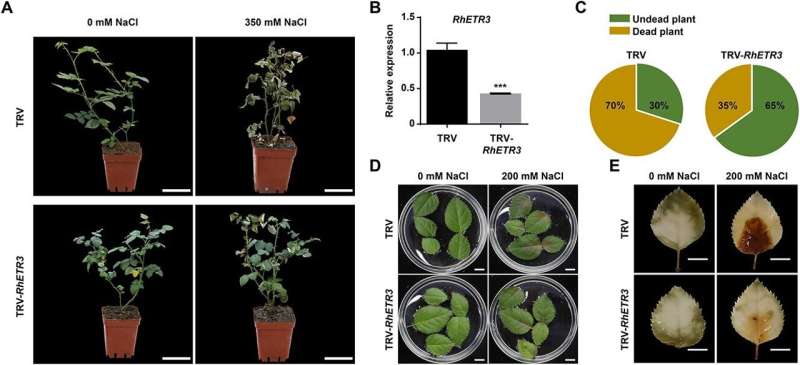This article has been reviewed according to Science X's editorial process and policies. Editors have highlighted the following attributes while ensuring the content's credibility:
fact-checked
peer-reviewed publication
proofread
From greenhouse to desert: Ethylene receptor's role in rose salt tolerance

A study reveals a novel mechanism in roses where the Tryptophan-rich sensory protein (TSPO) degrades the ethylene receptor ETHYLENE RESPONSE 3 (RhETR3) to enhance salt tolerance. This discovery sheds light on the complex relationship between ethylene signaling and salt stress responses in plants, potentially guiding future agricultural practices to develop salt-resistant crops.
Soil salinity is a significant challenge affecting plant growth and crop yields worldwide. Roses, being heavily reliant on irrigation, are particularly vulnerable to salt stress, which reduces their productivity and quality.
Ethylene, a key phytohormone, plays a crucial role in plant stress responses, but its mechanisms in regulating salt tolerance are not fully understood. Due to these challenges, in-depth research is essential to uncover how ethylene signaling can be manipulated to enhance salt tolerance in plants.
Researchers from China Agricultural University and Shenzhen Polytechnic have published a study in Horticulture Research elucidating how the Tryptophan-rich sensory protein (TSPO) in roses degrades the ethylene receptor ETHYLENE RESPONSE 3 (RhETR3) to promote salt tolerance.
This study highlights the intricate mechanisms of ethylene signaling and its impact on plant stress responses. The findings reveal how the degradation of RhETR3 enhances ethylene production, thereby boosting the plant's ability to withstand salinity.
The research focused on the role of the TSPO protein and the ethylene receptor RhETR3 in regulating salt stress responses in roses. Under salt stress conditions, TSPO-mediated degradation of RhETR3 was observed, leading to increased ethylene production.
This process enhanced the expression of genes involved in salt tolerance, such as ACC SYNTHASE1 (ACS1) and ACS2, which in turn boosted the production of the ethylene response factor RhERF98. This response facilitated the scavenging of reactive oxygen species (ROS), improving the plant's overall tolerance to salt stress.
Silencing of RhETR3 resulted in higher salt tolerance in rose plants, while silencing RhTSPO led to increased sensitivity to salinity. Overexpression studies confirmed that RhTSPO's role in promoting RhETR3 degradation is crucial for the salt tolerance mechanism.
The study also demonstrated that co-overexpression of RhETR3 and RhTSPO could alleviate the negative effects of RhETR3 overexpression alone, highlighting the balancing act between these proteins in maintaining salt tolerance.
Dr. Xiaofeng Zhou, a senior researcher involved in the study, stated, "Our findings provide valuable insights into the ethylene signaling pathway and its critical role in enhancing salt tolerance in roses. This knowledge opens up new avenues for developing genetically modified plants that can thrive in saline environments, which is crucial for sustainable agriculture."
The discovery has profound implications for horticulture and agriculture, offering a pathway to develop roses and potentially other plants that can flourish in saline soils. This advancement could revolutionize cultivation practices in regions affected by soil salinization, ensuring sustainable crop production and ecological balance.
By manipulating the RhETR3-RhTSPO module, breeders can potentially create plants that maintain productivity even under harsh saline conditions, contributing to food security and environmental resilience.
More information: Qingcui Zhao et al, TSPO-induced degradation of the ethylene receptor RhETR3 promotes salt tolerance in rose (Rosa hybrida), Horticulture Research (2024). DOI: 10.1093/hr/uhae040
Journal information: Horticulture Research
Provided by TranSpread





















